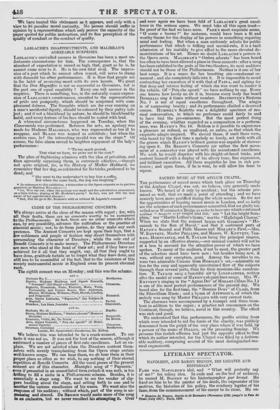CLOSE OF THE PHILHARMONIC CONCERTS.
WE always arrive at the close of the season with regret ; for, with all their faults, there are no concerts worthy to be compared to the Philharmonic. In fact, there are no other concerts which can, by any possibility, advance the cultivation or the practice of classical music ; nor, to do them justice, do they make any such pretence. The Ancient Concerts are kept upon their legs, that a few noblemen and people of fashion may divert themselves with personating the character of Directors ; while the sole end of Benefit Concerts is to make money. The Philharmonic Directors are men who stand at the head of their art; and if they have not achieved for it all that they might, nay, all that they ought to have done, gratitude forbids us to forget what they have done, and
• still less to be unmindful of the fact, that to the existence of this society instrumental music in England owes its present elevated rank.
The eighth concert was on Monday; and this was the scheme.
Aria, Signor Donzelli, " Pria cite spunti" (II Matri- monio Segreto) ................... ..... ........ Cimarosa.
Overture, Coricdano . —• - . Beethoven. Leader, Mr. Spagnolitti—Co. ............. ..... .........
We believe this was intended to be a crack-concert. ,To our taste it was not so. It was not the best of the season, although it embraced a number of pieces of first-rate excellence. Let us ex- plain. We are not satisfied when the Directors content them- selves with merely transplanting from the Opera stage certain well-known songs. We can hear them, we do hear them in their proper place as often as we wish, to say nothing of their eternal repetition at Benefit Concerts. All the vocal pieces of the present .concert are of this character. Mustafa's song of " Papuccie," even if presented in an unmutilated form (which it was not), is too ,trilling to fill a niche in a Philharmonic scheme. Besides, it is essentially a stage song. We want to see the vender of slip- pers bustling about the stage, and setting forth to one and to another the various excellences of his wares. We want also the response of his auditors ; without which, part of the song is un- meaning and absurd. DE Bs orris would make more of the song in an orchestra, but we never recollect his attempting it. Over
ACT I.
Sinfonia No 7 . . . Duetto, Madame Malibran and Signor Donzelli, " Svenami" (Gil Orazzi e Curiazzi).... ..... ....... Septetto. Pianoforte, Flute, Clarinet, Horn, Viola, Violoncello, and Contra Basso, Mrs. Anderson, Messrs. Nicholson, Willman, Platt, Moran, Lindley, and Dragonetti . Aria, Signor Lablache, "Papuccle," (La Schiava di Bagdad) . .
Overture, Les Deux Journees ....... . .............
ACT II.
Sinfonis No.10 . Scene, Madame Malibran, " Ombra adorata" (Romeo e
Giuletta) . . ..... ..... Concerto, Violin, Mr. Be Beriot
Beethoven. Cimarose.
Hummel.
Pacini. Cherubini.
Haydn.
Zingarelli. be Beriot.
and over again we have been told of LABLACHE'S great excel- lence in the serious opera. We must take all this upon trust— for proof of the fact we have none. PA.ER'S most exquisite scena, "0 come e buono ?" for instance, would have been a fit and worthy theme for the display of his powers in something requiring mind and feeling. But when a man uniformly selects for public performance that which is trifling and second-rate, it is a tacit admission of his inability to give effect to the more elevated de- monstrations of his art. Hence we doubt LABLACHE'S powers in the Opera seria. MALIBRAN'S " Ombm adorata" has been heard too often to have been allowed a place in these concerts : after a song has been exhibited to the gods of the two theatres, its next auditors should not be those of the Philharmonic. Neither is it one of her best songs. It is a snare for her besetting sin—exuberant or- nament; and she completely falls into it. It is impossible to avoid contrasting her execution of it with that of PASTA, and sighing for that deep and intense feeling of which she was wont to render it the vehicle. Of" Pria che spunti " we have nothing to say. Every one knows how lovely an air it is, because every body has heard DONZELLI sing it times without number. BEETHOVEN'S Sinfonia No. 7 is not of equal excellence throughout. The adagio is of sarpassing beauty ; and its performance elicited a deserved encore. HUMMEL'S Septetto was a delightful specimen of mu- sical conversation, in which no performer could fairly be said to have had the pre-eminence. But the most perfect thing of the evening, whether regarded as a composition or a perform- ance, was HAYDN'S No. 10. Seldom is it possible to experience a pleasure so refined, so unalloyed, so entire, as that which the exquisite adagio inspired. We envied those, if such there were, who heard for the first time a melody so lovely, set forth with all the graces which HAYDN'S brilliant genius was capable of shower- ing upon it. DE BERIOT'S Concerto Or rather the first move- ment of a concerto) was played with his accustomed excellence. We wish he would dispense with his sleight-of-hand tricks, and content himself with a display of his silvery tone, fine expression, and brilliant execution. All these requisites he has in rich pro- fusion ; and upon these, if he is wise, he will allow his fame to repose.


























 Previous page
Previous page